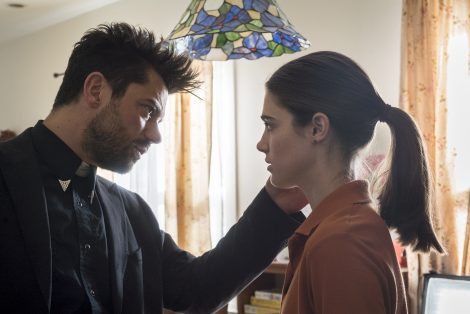Synopsis of 1×4: Jesse comes up with a scheme to build up his flock. Tulip picks a fight at the whorehouse after a girl dies in a sinkhole. Cassidy dodges his responsibilities with the Adephi in a coke and sex binge.
Rating: ★★★☆☆
In it’s biggest moments, Preacher shares an awful lot of traits with a fellow faith-based cable series, the little-loved and long-mourned HBO series Carnivàle. Both shows share a fascination with the seductive power of belief, both in religion’s ability to draw disparate people to a single purpose as well as the sinister power faith can hold over the easily swayed.
In the final scenes of “Monster Swamp,” as Jesse drives his newly formed flock in a revival-esque display of his new found power, Preacher begins to tackle heady questions of the difficulty of personal agency, destiny, and faith in the same way Carnivàle so often did. However, it’s a scene that shares the exact same flaws of the earlier series, with both being far more content to ask big questions than ever get around to answering them.

Some of that problem could be alleviated if there were more structure to the episode itself. Even by comparison to the fairly loose structures Preacher has used so far, “Monster Swamp” is meandering. There’s a lot here about Jesse working to convince Quinncannon to come to church with a land offer while bringing a larger audience through a questionable raffle. Meanwhile, Cassidy’s mostly just doing coke and hanging out in the same whorehouse as Tulip, who gets virtually nothing to do all hour.
It leaves everyone mostly chasing rabbit holes as far deep as they can go. Jesse’s lost in memories for most of the hour when he’s not talking with Emily. He’s mostly lost in memories of his father, who continues to be a very rough, inconsistent character. There’s a sense that the show’s attempting to build John Custer as a complicated man, one wanting the best for his son but unable to live up to his own example, but that requires viewers to bring an awful lot of context to a fairly poorly explained character.
![[AMC]](http://www.nerdophiles.com/wp-content/uploads/2016/06/PRE_103_LJ_0307_0221-RT-470x314.jpg)
The scenes with angels Fiore and Deblanc are much the same. Desperate to return to heaven with Genesis before they’re missed, the pair begin to pressure Cassidy to bring Jesse in faster and begin to ponder whether they’re in over their heads. It’s a bizarre use of the show’s time.
Neither character serves much of a purpose beyond some fish out of water humor whenever they show up and the Chekhov’s gun of a ringing, angelic phone would carry a lot more weight if the show would take any time to establish just what the fuck is going on with it.
So many of the episode’s plots struggle with the same problem. The sinkholes on Quinncannon’s property seems like it’s meant to be a larger part of a much larger plot but it doesn’t connect to anything or go anywhere. At best, it’s characterization for Quinncannon, showing his corruption and the destruction he brings to everything he touches, as well as another showcase of Tulip’s righteous, seemingly directionless fury, but it mostly just serves as another weird thing happening in a weird town to weird people.
![[AMC]](http://www.nerdophiles.com/wp-content/uploads/2016/06/PRE_103_LJ_0307_0877-RT-470x314.jpg)
There’s a world where that would be enough. Both Twin Peaks and, to a much lesser extent, Carnivàle, built stories around the bizarre and symbolic to enormous effect but both grounded the divine and the obscene in settings that were designed to support them.
For all its David Lynch-esque insanities, wordplay, and trail-of-breadcrumbs symbology, Twin Peaks operated on the idea of youth in revolt and the environments and people that allow them to operate freely. Carnivàle used the imagery and iconography of an America that had lost its way to set the stage for an unhinged morality play of with the souls of a generation at stake.
Annville of Preacher doesn’t yet have the same features that would allow that sort of tone to flourish. It feels like just another poor rural town, not even a Texas one and it makes the more fantastic moments of the show feel ill suited to the stories the show is telling.
Neither Jesse’s divine powers and Quinncannon’s more grounded sins feel particularly at home or a part of the world of Preacher and it’s a problem the show needs to correct as it becomes increasingly apparent just how much time is going to be spent here.
While the show hasn’t really corrected the problems with its secondary characters, it’s becoming apparent that the bigger problem could be making sure even the main ones feel at home in a setting that seems to be consciously rejecting them.